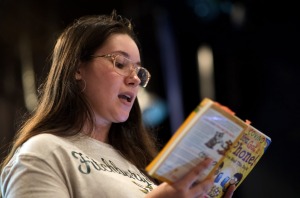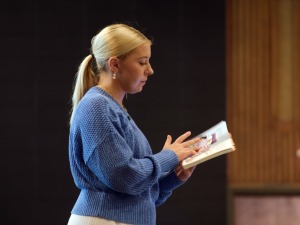English Studies Professor Katharine Covino understands the crucial nature of digital literacy and digital development. Her co-authored book, "You Got a Phone! (Now Read This Book),” explores the topic from a young reader’s perspective.
Covino, along with Special Methods of Teaching English II students and English Studies majors Matthew Gill, Gianna Murray, and Anne Skamarycz, presented in front of over 100 second-graders in the auditorium at McKay Elementary School on Oct. 1, focusing on the importance of digital development and literacy.
“Right now we’re putting cell phones in the hands of very young children,” said Covino. “We’re giving them these things that are addictive and we’re not really helping them understand how to use them. It’s coming from parents and families, but it’s also coming from schools. There’s so much good you can get from technology, but you have to help children understand how to use this powerful machine that you’re putting into their hands.”
"You Got a Phone! (Now Read This Book),” co-authored by Covino and Elizabeth K. Englander, is a guide for kids to use their phones safely and responsibly by covering topics like avoiding cyberbullying, posting photos online, managing phone-related anxiety, and balancing screen time with a healthy life. The book provides practical, humorous advice and includes tips and information for smart phone use to help kids navigate the benefits and potential problems of having a smartphone.
“We hope that because (the book) is kind of funny, there will be takeaways that the kids can gain about using (technology),” said Covino. “Even if they just stop and think for a second before sending that picture or before sending that text or before interpreting that text in a way that wasn’t intended … or if there’s a moment when they pause before they send something or they show someone when something doesn’t feel right, that’s the mission,” Covino continued. “If any of those small lessons that we share can be taken forward or even if it generates conversation, that’s something.”
McKay Elementary School Principal Sue Tingas was appreciative of Professor Covino and her students for delivering such impactful and important messages.
“This definitely will make an impression on them,” said Tingas. “I hope they remember to be kind always, whether it’s in person, on the phone or on video games.”
Murray, a Fitchburg resident, takes pride in giving back to the community.
“I’ve done a lot of volunteer work in my life, especially with my grandmother,” she said. “I want to give these children what many children, including myself, did not have when we were younger. I was never taught about internet safety. Having the opportunity to give back and give these kids something that is important for their growing up, it does mean a lot to me.”
Tingas hopes her students learn to “always talk to adults when you see or hear something on the internet.”
“There are some weird and silly things out there, and they need to definitely tell an adult about it because it may not be a good thing,” she continued.
The Fitchburg Cultural Council supports the programming and provides free books to the students.
Key themes and topics covered in the book include: digital safety, responsible online behavior, mental well-being, benefits of phones and practical advice.
Skamarycz, a Westminster resident, stresses the reality of a digital footprint.
“I grew up with technology, but not social media until probably late middle school,” she said. “These kids are second graders that have social media and phones. I don’t think they are attuned to how serious it can be and how nothing on the internet is ever really deleted forever. You do have that digital footprint and it will follow you everywhere. That’s just one side of it. There’s also the whole, you don’t know who someone is fronting to be online. There’s a huge safety part, identity and getting it through to kids when they are still young and showing them how serious it is, it’s really important.”
Covino, who shared concern about cyberbullying statistics that she called “staggering,” said she hopes her students will take valuable lessons from the experience at McKay. “They are going to be future teachers, so interacting with students, teachers, administrators, that’s good and important,” she said. “Also, presenting on a stage in front of kids … it’s a little scary and it’s good to get experience.”
Gill, from Ayer, said the speaking engagement was a great learning tool for when he’s front and center as a teacher.
“It’s learning to present in front of students and being relatable,” said Gill, who is also the student representative to the university’s Board of Trustees. “It’s about learning how to calculate your audience. I’m going to have to do that, even in high school.”
Covino said that this is part service and part developing relationships with the elementary school students and faculty at McKay.
“It’s important to share these messages about digital literacy and digital development,” Covino said. “It’s for the common good. I hope the students get experience, I hope that they help develop partnerships, and I hope that they stretch themselves, and if they feel a little nervous up on the stage, that’s good.”


